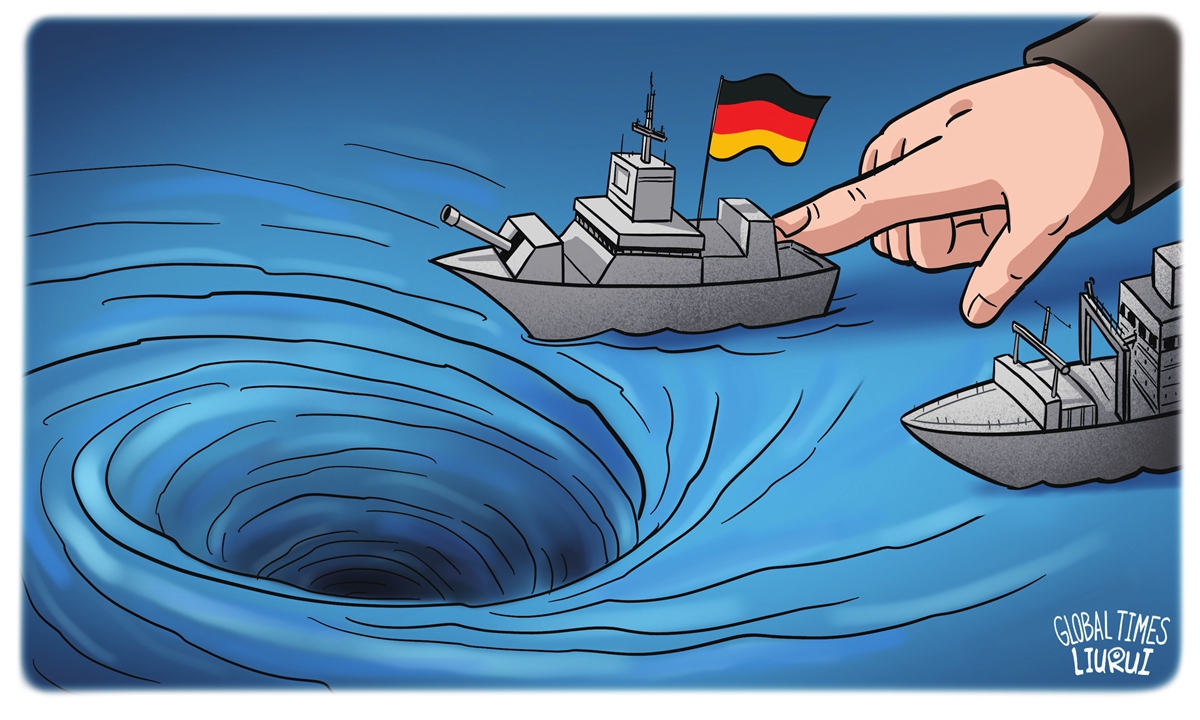
Illustration: Liu Rui/Global Times
Planning to send warships to pass through the Taiwan Straits, Germany is abandoning its prudent and rational approach of over 20 years by undertaking a move with nothing to gain and everything to lose.
Two German warships, the frigate Baden-Wuerttemberg and the replenishment ship Frankfurt am Main, are set to pass through the Taiwan Straits in the middle of this month, becoming the first German naval vessels to do so in 22 years, Spiegel magazine reported on Saturday. The head of the German Bundestag's Foreign Affairs Committee, Michael Roth, posted on X that the move aims to strengthen "freedom of navigation and stability" in the region.
Does "freedom of navigation" really necessitate choosing a route that is highly sensitive and clearly offends China's core interest? Both the German government and military are fully aware of the political implications of crossing the Taiwan Straits. They know that, for China, such a move constitutes a provocation. Respecting each other's core interests and major concerns is essential for a comprehensive strategic partnership. Is today's Germany about to forsake its previous political maturity?
Germany has recently increased its presence in the Asia-Pacific region. This year, it has not only signed a new defense agreement with Japan but also witnessed its defense minister make a historic visit to the Philippines, with plans to sign a defense cooperation agreement with Manila later in 2024.
Behind this series of moves lies the push from the US and NATO. The US has been endeavoring to expand NATO into the Asia-Pacific region. However, this planning is inconsistent with NATO's original mandate. After all, NATO stands for "North Atlantic Treaty Organization," not "North Atlantic-Pacific Treaty Organization." Consequently, a roundabout tactic has emerged - a growing number of individual NATO members are strengthening their military and defense cooperation with the Asia-Pacific region through joint military drills or by deploying aircraft carriers and warships. This trend does not occur under NATO's official banner; yet, in practice, it results in NATO's influence extending into the Asia-Pacific.
NATO countries' relevant strategies often reflect US policy, and it is not sure how much control other members really have, a retired US official told the Global Times recently.
If Germany aims to showcase its military presence in the Asia-Pacific, sending warships through the Taiwan Straits is the most ill-advised approach. This action appears to be primarily a favor for the US, signaling a supportive stance toward the US' tactics regarding the Taiwan question. However, Germany is unlikely to gain any benefits in return. Why is the US urging its allies to invest more efforts in the Asia-Pacific? Because it is bogged down by multiple crises and is struggling to maintain high-intensity military deployments there on its own. Therefore, Washington is utilizing its allies to create disturbances in the region to distract China.
If Germany does not take this step and simply continues its consistent policy of the past 22 years, there will be no significant loss. Its position within NATO and its relationship with the US would remain unchanged. However, if German warships were to sail through the Taiwan Straits, it would damage Germany's ties with China.
From any perspective, sending German warships through the Taiwan Straits is a move that offers all harm and no gain. Provoking China over its core interests does not seem like a decision made by a mature major power. There is no reasonable reason for Germany to do so and it still has time to reconsider.




